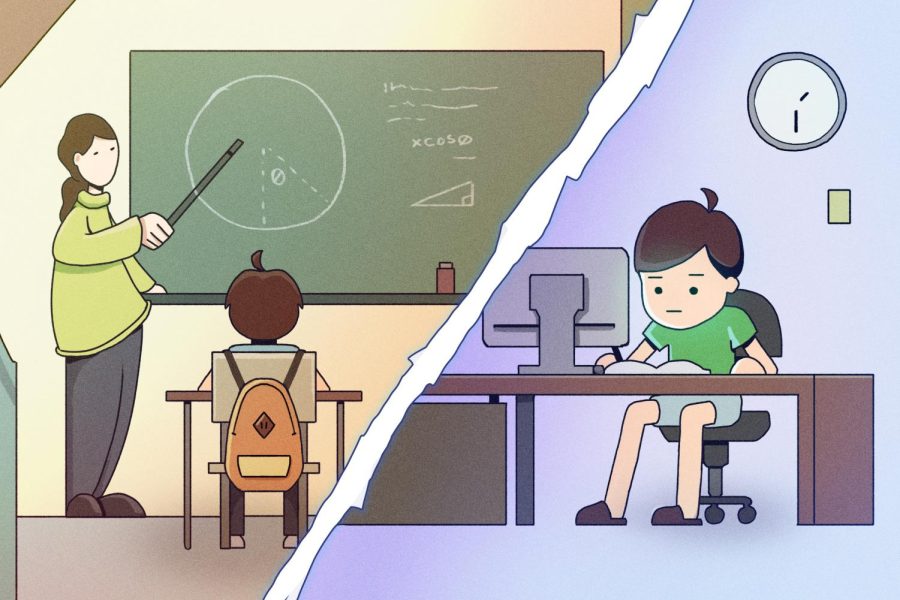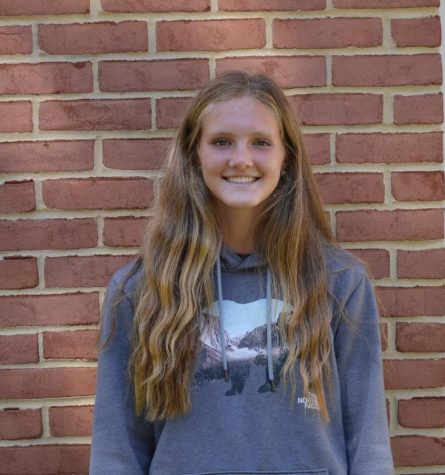The bell rings and students flood the halls, walking confidently to their next class without pausing to glance at their schedules. It’s the third quarter of the year and daily routines are etched into students’ memories. However, for Brazilian international student Helena Bedran Naumann, it’s her first day of school.
Each year, Whitman welcomes international students from across the globe. While adapting to the American high school curriculum, international students face unique social, linguistic and academic challenges.
Naumann, a sophomore, arrived at Whitman six months after introductory Student Navigator tours and course enrollment. Despite her best efforts, she spent her freshman year struggling to understand a foreign education system and find her place in the complex social environment.
“It was a really hard, traumatic experience,” Naumann said. “I thought it was going to be easier adapting here.”
Before enrolling at Whitman, international students from non-English-speaking countries take a two-hour state-mandated English Language Proficiency (ELP) assessment. The test assesses four domains of English comprehension: listening, reading, writing and speaking. Students are scored on a six-point scale, with a six denoting full fluency; students who score a 4.5 or below are placed in Whitman’s English Language Development (ELD) program.
The ELD program, formerly ESOL, aims to support non-native English speakers by supplementing their learning. Whitman’s ELD program offers an English class for students new to the language and a seminar elective for semi-fluent students in conjunction with a standard grade-level English course. Both English Department and ELD courses practice writing and analysis, but the ELD program is more focused on building language skills, said ELD teacher Michael Negrin.
Senior Kristi Zakja, who moved to America from Albania in 2022, was enrolled in the ELD seminar elective. Through the course, Zakja built close connections with Whitman students and received support from faculty.
“They still help me a lot,” Zakja said. “I feel like it’s a good source to get help for international students because they know how to describe things to you in an easy way.”
Although the ELD program provides support to many international students, some in need of its assistance have been excluded due to their ELP scores. This has led some Whitman students and faculty to question the accuracy of the assessment, including Freshman Zixuan Zhao, who moved to the US from China in March 2024.
“My English level met the standard so the school did not allow me to take the [ELD] class,” Zhao said. “But in fact, I was just guessing [on] the test.”
Zhao attempted to retake the screener exam to be placed into the ELD program, but she couldn’t because the county requires an extensive waiting period before retaking. Zhao is now enrolled in a standard English course, which she finds difficult to navigate and understand.
The rigid system has been frustrating for ELD teachers as well, Negrin said. Since students can’t opt into the ELD program, Negrin has had to find workarounds to support struggling students who tested out.
STEM classes, which are typically terminology-heavy, pose an additional obstacle for non-native English speakers. Junior Miranda Rodriguez, who transferred to Whitman from Venezuela two years ago, initially struggled to keep up in an English-speaking math class.
“A lot of concepts of math are dealt in different ways…depending on the country,” Rodriguez said. “Some stuff that is basic I learned differently.”
Unfamiliar English terms and American-specific concepts pose challenges to international students’ education. For ELD students, these challenges can be alleviated through testing accommodations such as a bilingual dictionary and extended time, Negrin said. Zakja is grateful that these accommodations are guaranteed for all ELD students and believes they helped ease his transition to an English-speaking school. However, international students like Rodriguez who were not placed in the ELD program do not qualify for these accommodations.
“I’m technically fluent but … I’m not fluent enough so that I don’t have problems with English,” she said, “But I cannot also ask for accommodations because I scored enough to not be considered for it. So it’s a weird limbo.”
According to a 2019 study, bilingual people processed texts 10% slower in their second language. The disparity in reading speed between native and non-native speakers exhibits a potential academic disadvantage for international students. Rodriguez believes all international students should be allowed to apply for academic accommodations regardless of whether they qualify for the ELD program.
“I just want enough autonomy so that I can translate something I need to and also feel like I’m actually learning,” Rodriguez said.
Inaccessible accommodations are just one of many challenges international students face as they navigate a foreign curriculum. Since global education systems are diverse in curricula, transferring course credits internationally is difficult. Naumann was shocked when Whitman did not accept her Physical Education, Biology and Geometry credits. She called the International Student Enrollment Department and after arguing her case with school and county officials, she was ultimately able to transfer nine and a half high school credits from her Brazilian school. Naumann’s persistence and the department’s support convinced her counselor to place her out of Biology A.
Advanced Placement registration, graduation requirements and college applications vary greatly from country to country, and many international students feel it is unfair for schools to assume their familiarity with this foreign education system. Rodriguez and Naumann believe a comprehensive guide explaining the fundamentals of the American education system would ease international students’ transition.
Coming into the school year late, Naumann struggled to find her place. She experienced culture shock when Whitman students made little effort to include her.
“When I got [to Whitman], I wasn’t feeling at all like a member here,” Naumann said. “I felt like I didn’t belong.”
Naumann found her place in the clubs Whitman offers. She signed up for the Whitman Student Navigators program to give tours and welcome new students to the school community.
“After that, I just started to realize people actually do clubs here,” Nauman said. “I really want to be involved in every club that I can possibly be in.”
Her experience with the Navigators inspired Naumann to become more involved in the Whitman community. She resolved to help students like herself — who transferred halfway through the school year — find their place in the community. Together with faculty, she brought back a former Navigators program to orientate new students throughout the year.
“That’s something I think we’re doing that is helping a lot of international pupils,” Naumann said. “It helped me a lot because I felt like I was doing something for the school.”
















